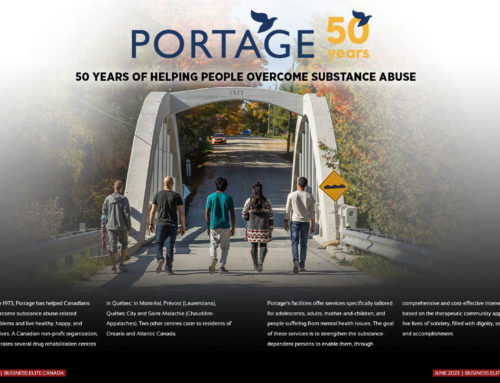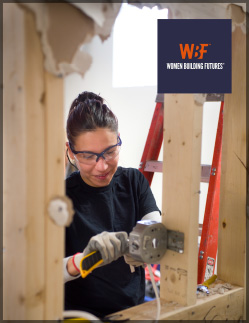By Anna Guy
By 2026, The construction and maintenance industry will lose close to 250,000 skilled workers (Build Force). Women Building Futures is working to fill that gap.
In 2018, there are approximately 6.2 million women in Canada between the ages of 20 and 44—an estimated 47 per cent of the Canadian labour force, and yet less than 4 per cent of the on-site construction and maintenance workforce across Canada. “If we were to attract and hire just 1 per cent of these women, this would mean 62,000 new skilled workers and address 25 per cent of the forecasted workforce shortage,” says Women Building Futures President and CEO, Kathy Kimpton. “Simply put, women are Canada’s largest untapped labour resource.”
One of the most interesting things about profiling Canada’s most successful business and organizations is how many of them have started out in a basement, or with only a handful of people and not a lot of resources, but a ton of heart.
Women Building Futures (WBF) is no exception. Now a bonifide leader in preparing women for economically prosperous careers in industries where women have historically been under-represented, an organization that has helped thousands of women find a place in the workforce—WBF started as a small group of women, social workers mostly, in an empty basement in downtown Edmonton in 1998.
Helping Women Enter the Trades
“This group was looking for ways to help women out of poverty,” says Kimpton. “Many of the women they worked with weren’t necessarily unemployed but underemployed, working hard at multiple jobs, accessing social programs and still barely making ends meet. They were surrounded by brothers, fathers and husbands who had highly paid jobs in construction and oil and gas, jobs that were easier for men to obtain. As a solution to the problem, this group decided they could train and empower women to be successful in these same jobs.”
The solution caught on quickly. By 2006, WBF purchased and started working out of a warehouse in downtown Edmonton only a few blocks away, and with the help of many this space was transformed into the Suncor Training Centre which is buzzing with activity today—training for WBF’s Journeywoman Start class #80 with facilities including workshops for pre-apprenticeship training for six different trades: Carpentry, Welding, Plumbing, Pipefitting, Electrical and Sheet Metal.
Housing
Workshops aren’t the only type of space at WBF. In order to fulfill its mission, WBF places a great deal of emphasis on eliminating barriers to employment for women, housing being a major one. WBF expanded its Training Centre to include housing: 42 fully-furnished units are equipped to meet all the basic needs of women and their children during their program. “Our housing is single gender, safe, not subsidized but affordable for downtown Edmonton and flexible in terms of length of stay,” says Kimpton.
“Our mission is to provide economic freedom for women through assessment, training, job placement and job retention support,” continues Kimpton, citing the average annual income of a woman working in Canada is just over $36,000 per year. “What the women we serve all have in common is they are looking for a change and want to build their own future. They come to WBF because we do things differently. We pride ourselves on exceptional hands-on training and workplace preparedness. Our support doesn’t end at graduation. With ongoing support services, we can ensure a high employment rate for our graduates. Bottom line, there’re looking for jobs and with the support of our industry partners, that’s what we have to offer.”
Reaching out to the Indigenous community
2017 marked a significant growth in WBF’s Indigenous Relations strategy, from a focus on tactical initiatives to a holistic approach that encompasses engagement, barrier reduction, foundational learning, hands-on skills training and partnership with Indigenous communities and organizations. “This fundamental shift created meaningful engagement and enhanced our ability to provide resources and services that contribute to the prosperity of Indigenous women today, and for many generations to come,” says Valerie Moses, Senior Strategist, Indigenous Relations. The strategy is working well, with 1,157 Indigenous women and 48 Indigenous communities and organizations engaging with WBF in 2017.
Working with Women Building Futures
When asked what she would say to someone considering working with WBF, Kimpton says, “There are both heart and head reasons to work with WBF. A social purpose as well as a business case. If you were to speak to our industry partners you might hear that they love our programming and the fact that our graduates are ready to contribute on day one! We’re constantly looking to create new programs to meet industry needs, customizing programs for specific employers and adding new programs to reflect industry’s workforce demands. “
Corporate Partnership
WBF partners have come to recognize the unrivalled level of preparedness that its graduates come to work with. “A WBF grad walks onto the job site ready to work with the skills to succeed, such as work ethic, drive, determination and resiliency. “And there is also the bottom line impact of working with WBF,” adds Kimpton. “We all know the “cost” of turnover. Hiring and retaining skilled workers is a business case every organization understands and is something that WBF can help address.”
With over 100 corporate partnerships and close relations with government and post-secondary institutions, Kimpton says WBF’s partnerships “help us fill a training gap that drives the economy and expand our online and face-to-face learning options. Our partnerships enable us to reach more women, in more ways and provide more solutions for industry.”
WBF’s next big event is the WORK PROUD Summit taking place in Edmonton October 2-4, 2018. Trade Perspectives is the theme of the Summit and the significance of that phrase highlights the current challenges facing industry and governments all across the country. The Summit will tackle issues that impact how we do business and what is needed to develop best practices that create workplaces that meet the challenges of the next generation. Going forward, Kimpton says her goal for WBF is a larger impact through growth, specifically with expansion through B.C., with an eye on other provinces in the near future.
In closing, Kimpton recalls a student in a WBF partnership program that just received the 2018 Workforce Development award from the Construction Owners Association of Alberta. “She had family that worked in the trades but until she attended an Information Session hosted by Women Building Futures, she had never considered a career like that for herself. She participated in a program with WBF, the Northwest Redwater Project, Ironworkers local 720 and Insulators 110, graduated and began working immediately at NWR as an ironworker. She felt she was able to tackle issues with the knowledge and confidence gained through her training with us. The first time I met her, I asked her what the WBF opportunity meant for her. She held up a set of keys and said ‘This’ to which I responded ‘What?’ The keys were for her new home – something that represented economic freedom and stability for her children. Her new career allowed her to break the cycle of poverty—forever. This is the type of story we want to spread across the country.”







